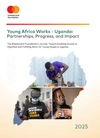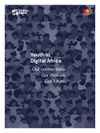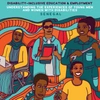Digital

The digital economy will empower African entrepreneurship and businesses. The IFC estimates that potential business-to-business and business-to-government opportunities in Sub-Saharan Africa could generate $120 billion in revenue. To realize this potential, 625 million people with digital skills will be needed. By 2050, approximately 40 percent of the world’s population under 18 will have been born and raised in Africa, positioning them to become the world’s digital skills workforce.
Consistent with its Young Africa Works strategy, the Mastercard Foundation is committed to empowering young people digitally in Africa. Programs cover the following:
1. Digital Skills Development: This includes enabling support for institutions to deliver digital skills and STEM training, working with partners such as the African Leadership Group, eMobilis, Moringa School, Harambee, and Carnegie Mellon University (CMU) Africa. These programs enable young people to transition into work, including technology-related careers. Examples include:
- In Kenya, the Foundation is working with eMobilis to support a national initiative driven by Kenya’s Ministry of Information, Communications, and Technology to enable one million youth to access digital job opportunities.
- An endowment was provided to Carnegie Mellon University Africa that has established a Center for Digital Inclusion, which is working with universities across Africa to develop digital talent and digital entrepreneurs.
2. Digital Entrepreneurship: Foundation programs are enabling entrepreneurship across multiple sectors such as FinTech, AgriTech, EdTech, and HealthTech. For example, a partnership with the Africa Founders Ventures (AFV) Program provides technical support and pre-seed capital to at least 100 high-potential, primarily women-led, African ventures. AFV offers a digital learning platform to develop the skills and ideas of more than 5,000 aspiring African entrepreneurs through a venture design academy.
3. Higher Education E-Learning and STEM: Partnerships with African universities are strengthening academic programs dedicated to science, technology, engineering, and mathematics. Eleven institutions are enhancing their capability in instructional design and online pedagogy and developing online content.
4. Education Technology (EdTech): The Foundation’s Centre for Innovative Teaching and Learning is enabling African countries to leapfrog into best-in-class EdTech solutions to reach all learners and improve learning outcomes. The Centre works with EdTech hubs and entrepreneurs across the continent. More than 40 EdTech ventures have been supported to date. In addition, the program supports learning institutions to integrate high-quality, culturally relevant, and inclusive EdTech solutions into their curriculum.
5. Digital Economy Research: Research is underway to answer critical questions about the technology sector and its impact. The Africa Youth Employment Clock was launched in 2024 and uses advanced data modelling and visualization to provide real-time job growth and forecasts of employment trends in Africa. These data are disaggregated by key variables such as employment status, age, gender, and sector, up to 2030.
The Mastercard Foundation intends to scale up its digital skilling programs. Based on demand from employers and economic sectors, these programs will skill and enable young people from economically marginalized communities to access local and global work opportunities. We will continue to support and scale the integration of technology into education to enable social inclusion and resilience.
Global AI Summit on Africa
April 3-4, 2025
At the Global AI Summit on Africa (April 3-4, 2025) in Kigali, Rwanda, Mastercard Foundation is co-hosting a youth-focused session that will bring together young innovators and current trailblazers in the global AI industry to explore how we can ensure AI development in Africa is both inclusive and impactful.

Latest Digital Research
View All-
Preparing For AI In The BPO And ITES Sector In Africa
Digital Uganda, Nigeria, Kenya, Rwanda, South Africa -
Young Africa Works – Uganda: Partnerships, Progress, and Impact
Education and Transitions Uganda -
Youth in Digital Africa Report to Inform Policy Changes for 400 Million Young Africans
Digital -
Disability-Inclusive Education and Employment: Understanding the Experiences of Young Men and Women with Disabilities - SENEGAL
WAEMU
Digital Latest
-
40% Of Tasks In Africa’s Growing Tech Outsourcing Sector May Be Affected By AI By 2030
-
Supporting Promising EdTech Companies: The Mastercard Foundation EdTech Fellowship Opens Applications for the Second Cohort in Tanzania
-
WAEMU EdTech Conference 2024 Gathers 150 EdTech Stakeholders in Dakar to Discuss Scaling Start-ups for Success and Transforming Education
-
Mastercard Foundation EdTech Fellowship in Ghana Opens New Call for Applications Following Successful First Cohort
-
Co-creation HUB Announces Call for Applications for Cohort III of the Mastercard Foundation EdTech Fellowship
-
Indigenous Prosperity Foundation and the Mastercard Foundation Partner to Accelerate Indigenous Entrepreneurship
-
From Refugee Camp to AI Creator: The Untold Story of Kakuma Girls
-
Systematizing EdTech Integration Into The Curriculum
-
Underwriting Foundational Infrastructure Through Creative Use Of EdTech Resources
-
Investing in public administration data systems to support decision-making
-
Opinion: Africa's AI Future Hinges On Youth Investment
-
Harmonizing Cross-Sector Policy For EdTech Adoption

Partner
Partnership for Digital Access in Africa
The Partnership for Digital Access in Africa (PDAA) was created in 2024 to bring together private and public sector leaders from Africa, the United States, and other parts of the world to bridge Africa’s digital divide. PDAA has set an ambitious goal to double the number of people connected to, and meaningfully using, the internet in Africa from 40 percent to 80 percent, connecting one billion people by 2030, and to increase connectivity for women and girls from 30 percent to 80 percent.
























